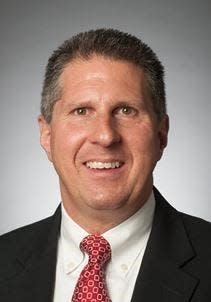Glendale mayor says Netflix wrongly charged Milwaukee sales tax to Glendale residents
After Netflix apparently charged Glendale residents the City of Milwaukee's sales tax, which was recently raised 2%, in its most recent billing cycle, Glendale's mayor is calling for the subscription streaming service to investigate and correct the error on residents' accounts.
The problem underscores a broader issue another suburban mayor says he saw coming.
In a letter sent to Netflix's Research Team Jan. 4, Glendale Mayor Bryan Kennedy said although the City of Milwaukee's sales tax is now 7.9%, the sales tax for the rest of Milwaukee County's suburban communities, including Glendale, remains at 5.9%.
Most of Glendale lies in the 53209 ZIP code, which also includes a piece of the City of Milwaukee and part of Brown Deer.
"It appears that your billing system defaulted 53209 to City of Milwaukee, and charged me and hundreds of other Glendale residents the additional 2% sales tax," Kennedy said in the letter.
"That money does not return to the Glendale treasury. Your system is illegally billing Glendale residents for a City of Milwaukee tax and passing sales tax revenue to Milwaukee," he said.

But the issue evidently isn't specific to Glendale or Netflix. Kennedy said other companies in the areas surrounding the city told Kennedy their systems have been defaulting to Milwaukee's 7.9% sales tax.
"This is just the tip of an iceberg," Kennedy said. "There's a lot of stuff we need to get figured out now as to how the county, the City of Milwaukee or the Department of Revenue is going to fix this."
More: Milwaukee's mayor responds to Washington County official's digs over sales tax increases
Kennedy requested Netflix run an audit for the 52309 ZIP code and separate Glendale customers from the Milwaukee customers in its billing.
He said the streaming company should proactively correct the error in Glendale customers' accounts, as opposed to requiring hundreds of residents to reach out individually using Netflix's complaint system, which Kennedy said was inaccessible to many users.

Netflix typically requires complaints to be submitted in letters faxed to the company, and Kennedy said he had to use the Glendale Police Department's fax machine because even the village doesn't have one anymore.
While Netflix subscriptions cost a few dollars a year, when added up amongst thousands of people in contiguous communities, the errors could cost residents a significant amount of money, Kennedy said.
The Journal Sentinel's attempts to reach Netflix were not immediately successful.
Both Kennedy and Greenfield Mayor Michael Neitzke, whose city also shares ZIP codes with Milwaukee, requested for the issue to be added to the agenda for the next Intergovernmental Cooperation Council meeting Jan. 8. The ICC is a Milwaukee County coalition of mayors, village presidents and administrators from each of the 19 municipalities in the county.
Neitzke said officials have known since last summer when the tax increase passed that the issue of how sales tax is collected and how ZIP codes are arranged in Milwaukee County would adversely impact some municipalities.
Concerned about the potential for Greenfield residents to be paying Milwaukee’s new sales tax, Neitzke raised the issue with the ICC. He also reached out to state Sen. Julian Bradley, who was told by the Wisconsin Department of Revenue that any issues would be taken care of.
However, on Dec. 5, Greenfield’s Common Council passed a resolution that halts any Milwaukee sales taxes and called upon the City of Milwaukee to take up the “burden that results in the collection of improperly and illegally collected sales taxes,” according to the resolution.
Like Kennedy, Neitzke sees this as a larger issue, but his bone to pick is with what he calls an archaic postal code system and with companies that exclude smaller municipalities in their data. Even Apple and Google maps misattribute locations in Greenfield to Milwaukee, he said.
Before the new tax went into effect, Neitzke directed Greenfield's city attorney to prepare an injunction in the event that any Greenfield residents get charged for Milwaukee’s sales tax.
“I knew this was coming," Neitzke said. "Other cities knew this was coming. I don't know what a court will do with the injunction. But it just has to be figured out. And the solution can't be filing a claim with the City of Milwaukee to get your $30 or 30 cents back.”
Contact Claudia Levens at clevens@gannett.com. Follow her on X at @levensc13.
This article originally appeared on Milwaukee Journal Sentinel: Glendale residents see Milwaukee sales tax on Netflix bill, mayor says

